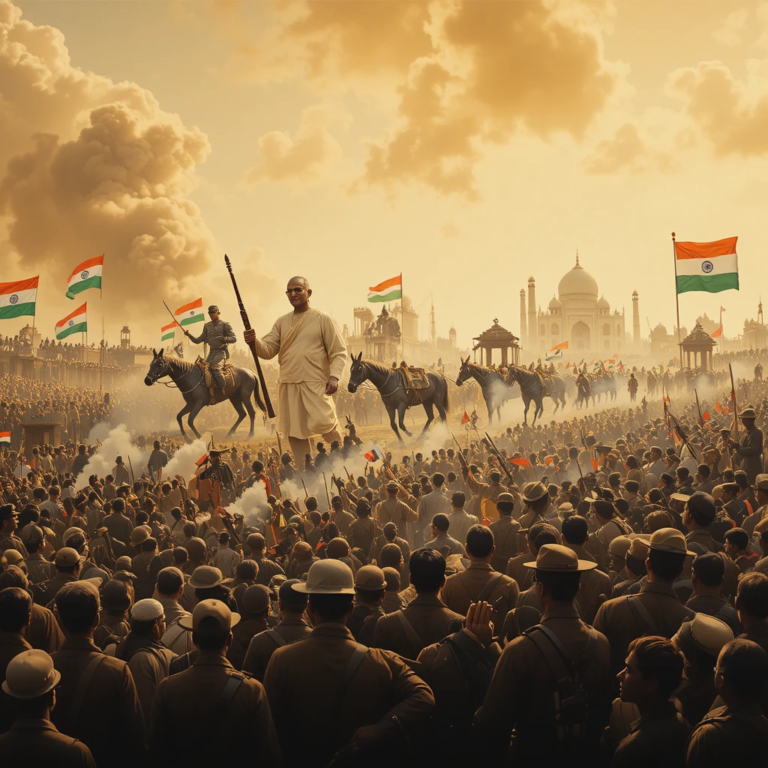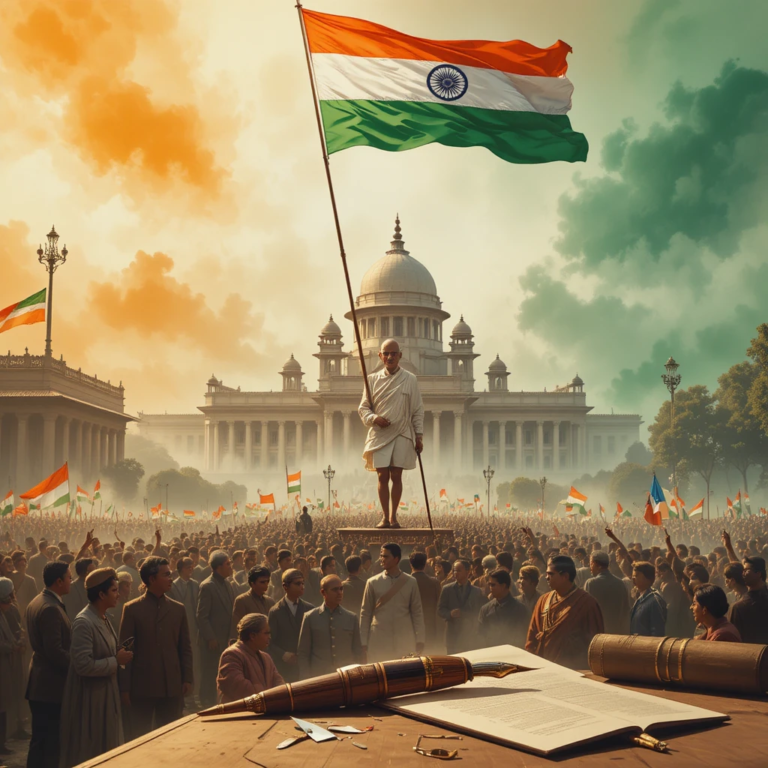Mahadevi Verma, often referred to as the “Modern Meera,” was one of the most influential figures in Hindi literature and a pioneer of the Chhayavaad (Romanticism) movement. A poetess, essayist, educationist, and social reformer, Mahadevi Verma left an indelible mark on Indian society through her lyrical poetry, feminist ideology, and tireless efforts to uplift women and the marginalized. Her works, imbued with deep emotional resonance, spiritual depth, and social consciousness, continue to inspire generations. In this article, we delve into Mahadevi Verma’s life—from her early years to her death—her literary contributions, her ideology, her role in Indian society, and her lasting impact.

Table of Contents
Early Life of Mahadevi Verma: A Foundation of Resilience
Mahadevi Verma was born on March 26, 1907, in Farrukhabad, Uttar Pradesh, into a progressive yet traditional family. Her father, Govind Prasad Verma, was a professor and a liberal thinker who supported education for girls—an uncommon stance in early 20th-century India. Her mother, Hemrani Devi, was a deeply religious woman who introduced Mahadevi to spiritual texts like the Ramayana and Bhagavad Gita, which later influenced her poetic themes.

A Childhood Shaped by Literature and Tradition
Growing up in a household that valued education, Mahadevi was exposed to literature and learning from an early age. She began writing poetry as a child, showing an innate talent for expressing complex emotions through words. However, her early life was not without challenges. At the age of nine, Mahadevi was married to Dr. Swarup Narain Verma, a common practice at the time. The marriage, however, was not consummated, and Mahadevi chose to pursue her education and independence rather than conform to societal expectations of married life.

Education and Awakening
Mahadevi Verma’s formal education began at a local missionary school, where she excelled in academics and developed a love for languages, including Sanskrit, Hindi, and English. She later attended Crosthwaite Girls’ School in Allahabad, where her literary talents blossomed. Her exposure to the works of poets like Rabindranath Tagore and the Romantic poets of the West shaped her poetic sensibility. She also studied at Allahabad University, earning a master’s degree in Sanskrit—a significant achievement for a woman of her time.

During her college years, Mahadevi became deeply involved in the literary and cultural movements of the time. She was influenced by the Chhayavaad movement, which emphasized emotional depth, individualism, and the beauty of nature in poetry. This period also marked the beginning of her lifelong commitment to social reform, particularly for women’s rights and education.
Literary Journey of Mahadevi Verma: The Voice of Chhayavaad
Mahadevi Verma emerged as one of the four pillars of Chhayavaad, alongside Jaishankar Prasad, Suryakant Tripathi “Nirala,” and Sumitranandan Pant. Her poetry, characterized by its lyrical quality, emotional intensity, and spiritual undertones, earned her the title of “Modern Meera,” drawing parallels with the 16th-century poet-saint Meera Bai, known for her devotional poetry.
Major Works of Mahadevi Verma
Mahadevi Verma’s literary career spanned several decades, during which she produced a remarkable body of work, including poetry, essays, and prose. Some of her most notable works include:
Poetry Collections
- Nihar (1930): This collection marked Mahadevi Verma’s entry into the literary world. Poems like “Main Neer Bhari Dukh Ki Badli” showcase her ability to weave personal sorrow with universal emotions, using nature as a metaphor.
- Rashmi (1932): A continuation of her Chhayavaadi style, this collection explores themes of love, longing, and spiritual yearning.
- Niraja (1934): One of her most celebrated works, Niraja delves into the complexities of human emotions, often reflecting Mahadevi’s own struggles with societal norms.
- Sandhya Geet (1936): This collection reflects a more mature and introspective Mahadevi, grappling with themes of solitude, self-realization, and the transient nature of life.
- Deepshikha (1942): A collection that blends her poetic sensitivity with philosophical depth, Deepshikha is a testament to her spiritual evolution.
- Yama (1940): A compilation of her best works, Yama earned Mahadevi Verma the prestigious Jnanpith Award in 1982, making her one of the first women to receive this honor.

Prose and Essays
Mahadevi Verma was also a prolific essayist, addressing social issues through her prose. Some of her notable prose works include:
- Shrinkhala ki Kadiyan (Links of the Chain): A powerful critique of the oppression faced by women in Indian society, this collection of essays highlights Mahadevi’s feminist ideology.
- Ateet ke Chalchitra (Sketches from the Past): A collection of memoirs that provide insight into her personal life and the socio-cultural milieu of her time.
- Smriti ki Rekhayein (Lines of Memory): Another memoir-style work, this book reflects on her experiences as a poet, educator, and social reformer.
Editorial Contributions
Mahadevi Verma served as the editor of the Hindi literary magazine Chand, which became a platform for emerging writers and a space for discussions on social reform. Her editorial work helped shape the literary landscape of the time, giving voice to marginalized perspectives, especially those of women.
Themes in Mahadevi Verma’s Poetry
Mahadevi Verma’s poetry is a rich tapestry of emotions, blending personal experiences with universal truths. Some recurring themes in her work include:
- Nature and Symbolism: As a Chhayavaadi poet, Mahadevi often used nature as a metaphor for human emotions. Clouds, rivers, and lamps frequently appear in her poetry, symbolizing sorrow, longing, and hope.
- Spiritual Quest: Her poetry often reflects a deep spiritual yearning, akin to the devotional poetry of Meera Bai. She sought a higher truth, often expressing her longing for divine connection through her verses.
- Feminist Undertones: Mahadevi’s work frequently addresses the struggles of women in a patriarchal society. Her critique of societal norms, as seen in her quote about Sita’s exile in the Ramayana, underscores her feminist consciousness.
- Sorrow and Solitude: Many of her poems explore themes of personal sorrow and solitude, reflecting her own life experiences, including her decision to live independently after her early marriage.
Mahadevi Verma’s Ideology: A Blend of Feminism and Humanism
Mahadevi Verma’s ideology was deeply rooted in her experiences as a woman in a patriarchal society and her empathy for the marginalized. Her worldview was shaped by a combination of feminist principles, spiritual beliefs, and a humanistic approach to social reform.

Feminist Consciousness
Mahadevi Verma was a pioneer of feminist thought in Hindi literature. At a time when women were expected to conform to traditional roles, she challenged societal norms through her life and work. She refused to live with her husband after her early marriage, choosing instead to pursue her education and career—a bold decision that defied the conventions of her time.
Her essays, such as those in Shrinkhala ki Kadiyan, highlight the systemic oppression faced by women, from child marriage to widowhood. She criticized the double standards imposed on women, as seen in her famous quote about Sita’s exile in the Ramayana: “Why didn’t any woman reject that ‘Ram’ who expelled his pregnant wife Sita from the house?” This statement reflects her belief that women should question patriarchal authority and demand justice.
Spiritual and Philosophical Beliefs
Mahadevi Verma’s spiritual beliefs were influenced by her mother’s devotion and her own study of Indian scriptures. Her poetry often reflects a longing for divine union, reminiscent of Bhakti poetry. However, her spirituality was not dogmatic; it was a personal quest for meaning and transcendence, often intertwined with her feminist ideals. She believed in the inherent divinity of all beings, advocating for compassion and equality.
Humanism and Social Justice
Mahadevi Verma’s humanism manifested in her commitment to social reform. She believed that literature should not only be an expression of beauty but also a tool for social change. Her work often highlighted the plight of the downtrodden, including women, widows, and the poor. She used her platform as a writer and educator to advocate for education, gender equality, and social justice, making her a true humanist.

Contributions of Mahadevi Verma to Indian Society
Mahadevi Verma’s contributions to Indian society extend beyond her literary achievements. She was a multifaceted individual who played a significant role in education, social reform, and the empowerment of women.
Role as an Educator
Mahadevi Verma was deeply committed to education, particularly for women. In 1936, she became the principal of Prayag Mahila Vidyapith, a girls’ school in Allahabad (now part of the University of Allahabad). Under her leadership, the institution grew into a center of learning and empowerment for women. She introduced innovative teaching methods, emphasizing holistic education that nurtured both intellectual and emotional growth.
Mahadevi also mentored young women, encouraging them to pursue their dreams and break free from societal constraints. Her role as an educator allowed her to directly influence the lives of countless women, many of whom went on to become writers, teachers, and activists.
Advocacy for Women’s Rights
As a feminist writer and thinker, Mahadevi Verma used her pen to advocate for women’s rights. Her essays and speeches addressed issues like child marriage, dowry, and the lack of educational opportunities for women. She called for a society where women could live with dignity and autonomy, free from the shackles of patriarchy.
Her critique of traditional narratives, such as her questioning of Rama’s treatment of Sita, challenged the cultural norms that perpetuated gender inequality. By giving voice to women’s struggles, Mahadevi inspired a generation of women to demand their rights and assert their individuality.
Social Reform Through Literature
Mahadevi Verma’s literature was a powerful tool for social reform. Her poetry and essays brought attention to the injustices faced by women and the marginalized, urging society to rethink its values. Her work as the editor of Chandmagazine provided a platform for discussions on social issues, amplifying the voices of those who were often unheard.
She also participated in the Indian freedom movement, aligning herself with the ideals of Mahatma Gandhi. While she did not take a direct political role, her writings reflected her support for the movement, emphasizing the need for a free and just society.
Impact of Mahadevi Verma on Indian Society and Literature
Mahadevi Verma’s impact on Indian society and literature is profound and far-reaching. Her contributions continue to resonate, influencing both literary traditions and social attitudes.
Influence on Hindi Literature
As a leading figure of the Chhayavaad movement, Mahadevi Verma played a crucial role in shaping modern Hindi poetry. Her lyrical style, emotional depth, and use of nature as a metaphor set a new standard for poetic expression. She brought a distinctly feminine perspective to Hindi literature, paving the way for future women writers to explore their identities and experiences through poetry.
Her recognition as a Jnanpith Award recipient in 1982 underscored her literary significance. She was one of the first women to receive this prestigious award, highlighting her contribution to Indian literature.
Empowerment of Women
Mahadevi Verma’s life and work inspired countless women to challenge societal norms and pursue their ambitions. Her decision to live independently, her success as a poet and educator, and her advocacy for women’s rights made her a role model for generations. She demonstrated that women could excel in intellectual and creative fields, even in a patriarchal society.
Her feminist writings encouraged women to question oppressive traditions and demand equality. Her critique of patriarchal narratives, such as her comments on the Ramayana, sparked discussions on gender justice, influencing feminist thought in India.
Legacy in Education and Social Reform
Mahadevi Verma’s contributions to education left a lasting legacy. The Prayag Mahila Vidyapith, under her leadership, became a beacon of women’s education, empowering countless girls to pursue their dreams. Her emphasis on holistic education continues to inspire educational institutions in India.
Her advocacy for social reform, particularly for women and the marginalized, contributed to the broader movement for gender equality in India. Her writings on social issues remain relevant, addressing challenges that persist even today, such as gender-based violence and discrimination.
Cultural and Spiritual Influence
Mahadevi Verma’s poetry, with its spiritual depth, continues to resonate with readers seeking meaning and solace. Her ability to blend personal emotions with universal truths makes her work timeless. Her nickname, “Modern Meera,” reflects her cultural significance as a poetess whose devotion to art and truth mirrors the Bhakti tradition.
Later Life and Death of Mahadevi Verma
In her later years, Mahadevi Verma continued to write and engage in social work, though she lived a relatively reclusive life. She remained unmarried, dedicating her life to literature, education, and social reform. Despite her fame, she lived simply, often in the company of her students and fellow writers.
Mahadevi Verma passed away on September 11, 1987, in Allahabad, leaving behind a rich legacy of literary and social contributions. Her death marked the end of an era, but her words and ideas continue to live on, inspiring generations of readers, writers, and activists.
Conclusion: Mahadevi Verma’s Enduring Legacy
Mahadevi Verma was more than a poetess; she was a visionary who used her art to challenge societal norms, advocate for the marginalized, and inspire change. Her contributions to Hindi literature, her feminist ideology, and her role as an educator and social reformer make her a towering figure in Indian history. Known as the “Modern Meera,” Mahadevi Verma’s poetry continues to touch hearts with its emotional depth and spiritual resonance.
Her impact on Indian society is evident in the way she empowered women, reshaped literary traditions, and contributed to the discourse on social justice. As we reflect on her life—from her early struggles to her lasting legacy—we are reminded of the power of words to transform lives and societies. Mahadevi Verma’s journey is a testament to the strength of the human spirit and the enduring relevance of art in the fight for a better world.
FAQs About Mahadevi Verma
1. Who was Mahadevi Verma?
Mahadevi Verma was a renowned Hindi poetess, essayist, and social reformer, known as the “Modern Meera” for her lyrical and spiritual poetry. She was a key figure in the Chhayavaad movement and a pioneer of feminist thought in Indian literature.
2. What are some famous works of Mahadevi Verma?
Some of Mahadevi Verma’s famous works include poetry collections like Nihar, Niraja, Deepshikha, and Yama, as well as essays like Shrinkhala ki Kadiyan and memoirs like Ateet ke Chalchitra.
3. How did Mahadevi Verma contribute to women’s rights?
Mahadevi Verma advocated for women’s rights through her writings, which critiqued patriarchal norms and highlighted women’s struggles. She also empowered women through education as the principal of Prayag Mahila Vidyapith.
4. What is the significance of Mahadevi Verma in Hindi literature?
Mahadevi Verma is considered one of the four pillars of Chhayavaad in Hindi literature. Her poetry, known for its emotional depth and feminist undertones, reshaped modern Hindi poetry and inspired future generations of writers.
5. When did Mahadevi Verma die?
Mahadevi Verma passed away on September 11, 1987, in Allahabad, leaving behind a legacy of literary and social contributions.




